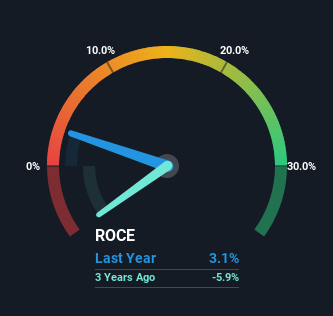- Hong Kong
- /
- Commercial Services
- /
- SEHK:976
The Returns On Capital At Chiho Environmental Group (HKG:976) Don't Inspire Confidence
When researching a stock for investment, what can tell us that the company is in decline? More often than not, we'll see a declining return on capital employed (ROCE) and a declining amount of capital employed. Basically the company is earning less on its investments and it is also reducing its total assets. On that note, looking into Chiho Environmental Group (HKG:976), we weren't too upbeat about how things were going.
Understanding Return On Capital Employed (ROCE)
For those who don't know, ROCE is a measure of a company's yearly pre-tax profit (its return), relative to the capital employed in the business. Analysts use this formula to calculate it for Chiho Environmental Group:
Return on Capital Employed = Earnings Before Interest and Tax (EBIT) ÷ (Total Assets - Current Liabilities)
0.031 = HK$179m ÷ (HK$8.8b - HK$3.1b) (Based on the trailing twelve months to June 2023).
Thus, Chiho Environmental Group has an ROCE of 3.1%. In absolute terms, that's a low return and it also under-performs the Commercial Services industry average of 7.4%.
Check out our latest analysis for Chiho Environmental Group

Historical performance is a great place to start when researching a stock so above you can see the gauge for Chiho Environmental Group's ROCE against it's prior returns. If you want to delve into the historical earnings , check out these free graphs detailing revenue and cash flow performance of Chiho Environmental Group.
What The Trend Of ROCE Can Tell Us
In terms of Chiho Environmental Group's historical ROCE trend, it isn't fantastic. To be more specific, today's ROCE was 6.6% five years ago but has since fallen to 3.1%. What's equally concerning is that the amount of capital deployed in the business has shrunk by 24% over that same period. The combination of lower ROCE and less capital employed can indicate that a business is likely to be facing some competitive headwinds or seeing an erosion to its moat. Typically businesses that exhibit these characteristics aren't the ones that tend to multiply over the long term, because statistically speaking, they've already gone through the growth phase of their life cycle.
What We Can Learn From Chiho Environmental Group's ROCE
In summary, it's unfortunate that Chiho Environmental Group is shrinking its capital base and also generating lower returns. Investors haven't taken kindly to these developments, since the stock has declined 64% from where it was five years ago. Unless there is a shift to a more positive trajectory in these metrics, we would look elsewhere.
One more thing, we've spotted 2 warning signs facing Chiho Environmental Group that you might find interesting.
If you want to search for solid companies with great earnings, check out this free list of companies with good balance sheets and impressive returns on equity.
New: AI Stock Screener & Alerts
Our new AI Stock Screener scans the market every day to uncover opportunities.
• Dividend Powerhouses (3%+ Yield)
• Undervalued Small Caps with Insider Buying
• High growth Tech and AI Companies
Or build your own from over 50 metrics.
Have feedback on this article? Concerned about the content? Get in touch with us directly. Alternatively, email editorial-team (at) simplywallst.com.
This article by Simply Wall St is general in nature. We provide commentary based on historical data and analyst forecasts only using an unbiased methodology and our articles are not intended to be financial advice. It does not constitute a recommendation to buy or sell any stock, and does not take account of your objectives, or your financial situation. We aim to bring you long-term focused analysis driven by fundamental data. Note that our analysis may not factor in the latest price-sensitive company announcements or qualitative material. Simply Wall St has no position in any stocks mentioned.
About SEHK:976
Chiho Environmental Group
An investment holding company, engages in the metal recycling business in Asia, Europe, and North America.
Adequate balance sheet low.
Market Insights
Community Narratives


Recently Updated Narratives

Astor Enerji will surge with a fair value of $140.43 in the next 3 years

Proximus: The State-Backed Backup Plan with 7% Gross Yield and 15% Currency Upside.


A case for for IMPACT Silver Corp (TSXV:IPT) to reach USD $4.52 (CAD $6.16) in 2026 (23 bagger in 1 year) and USD $5.76 (CAD $7.89) by 2030
Popular Narratives


MicroVision will explode future revenue by 380.37% with a vision towards success


The company that turned a verb into a global necessity and basically runs the modern internet, digital ads, smartphones, maps, and AI.



